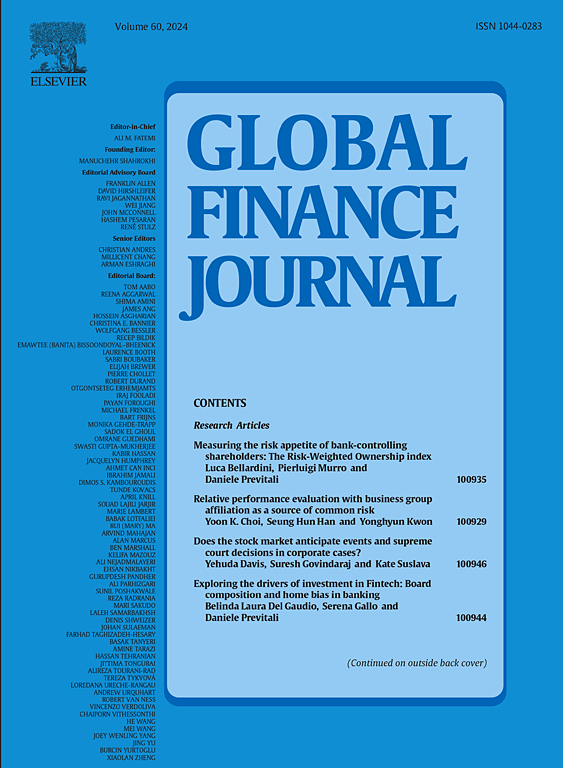Real effects of media climate change concerns
IF 5.5
2区 经济学
Q1 BUSINESS, FINANCE
引用次数: 0
Abstract
This study addresses the calls in prior research for evidence on the real effects of preferences for climate change risk by investigating whether companies with opposing externalities—brown versus green companies—adjust their climate-related activities in response to exogenous shocks in public concern for climate change, as reflected in news articles. We find that although brown companies reduce their direct and indirect greenhouse gas (GHG) emissions, they do not invest heavily in climate projects, suggesting a preference for cost-effective measures. Further textual analysis reveals that brown companies tend to use less complex stand-alone reports when communicating with external stakeholders. However, although green companies have greater access to low-cost external financial resources during unexpected changes in public concern, we find no evidence that they use these resources to reduce direct GHG emissions. Instead, our findings indicate only limited participation in indirect GHG reduction initiatives, with no significant allocation of these financial resources to dedicated climate projects. This reluctance of green companies to undertake direct GHG reductions is consistent with ongoing anecdotal discussions regarding the challenges of achieving net-zero targets, prompting a call for further research into potential barriers to greener transitions.
媒体关注气候变化的真实影响
本研究通过调查具有相反外部性的公司——棕色公司和绿色公司——是否调整其与气候相关的活动,以响应新闻文章中反映的公众对气候变化关注的外生冲击,解决了先前研究中对气候变化风险偏好的真实影响的证据的呼吁。我们发现,尽管棕色公司减少了直接和间接的温室气体(GHG)排放,但它们并没有在气候项目上投入大量资金,这表明它们更倾向于采用成本效益高的措施。进一步的文本分析表明,棕色公司在与外部利益相关者沟通时倾向于使用不太复杂的独立报告。然而,尽管在公众关注的意外变化中,绿色公司更容易获得低成本的外部金融资源,但我们没有发现证据表明它们利用这些资源来减少直接温室气体排放。相反,我们的研究结果表明,参与间接温室气体减排倡议的人数有限,这些财政资源没有大量分配给专门的气候项目。绿色企业不愿直接减少温室气体排放,这与目前关于实现净零目标的挑战的传闻讨论是一致的,这促使人们呼吁进一步研究绿色转型的潜在障碍。
本文章由计算机程序翻译,如有差异,请以英文原文为准。
求助全文
约1分钟内获得全文
求助全文
来源期刊

Global Finance Journal
BUSINESS, FINANCE-
CiteScore
7.30
自引率
13.50%
发文量
106
审稿时长
53 days
期刊介绍:
Global Finance Journal provides a forum for the exchange of ideas and techniques among academicians and practitioners and, thereby, advances applied research in global financial management. Global Finance Journal publishes original, creative, scholarly research that integrates theory and practice and addresses a readership in both business and academia. Articles reflecting pragmatic research are sought in areas such as financial management, investment, banking and financial services, accounting, and taxation. Global Finance Journal welcomes contributions from scholars in both the business and academic community and encourages collaborative research from this broad base worldwide.
 求助内容:
求助内容: 应助结果提醒方式:
应助结果提醒方式:


